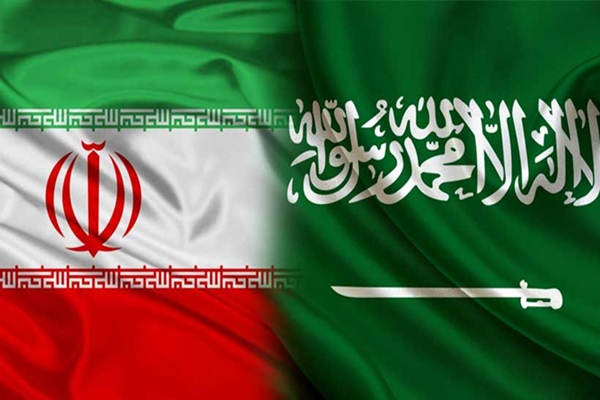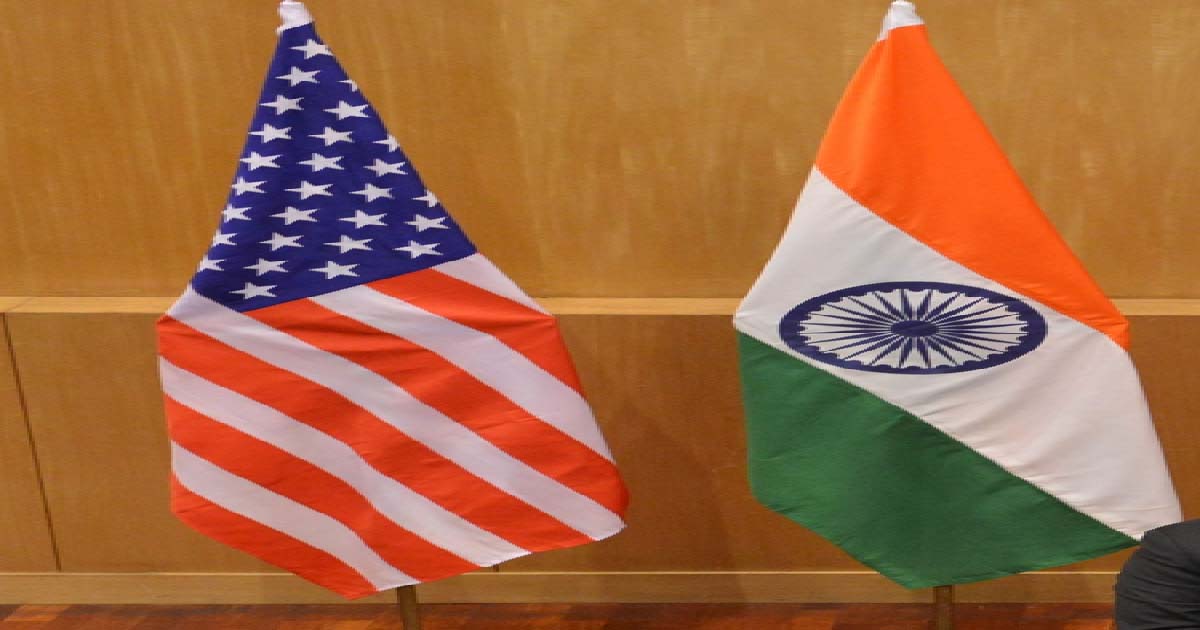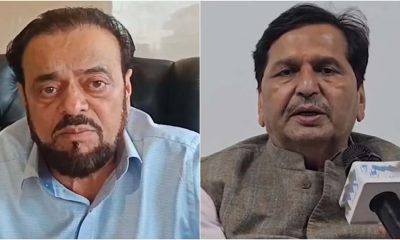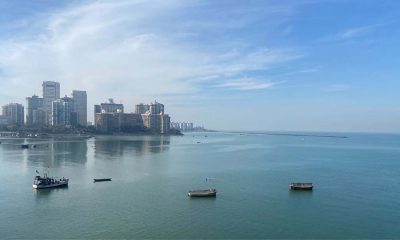International News
Saudi-Iran ties on mend

Recent developments in Saudi Arabia and Iran seems to be on an upswing and may lead to a better understanding amongst two old foes besides unfolding a new regional and global security paradigm.
It seems as if in this winter season, the ice between two largest Muslim countries i.e. Saudi Arabia and Iran, has started melting. One claims to be the leader of the Sunni domination, while the other is the Shia leader. Though this difference doesn’t hold any importance in difference of opinion between the two on various regional and global issues.
However, it seems that the current Saudi dispensation, led by Crown Prince Mohammad bin Salman is ready to forget the old enmity and forge a new relationship with its old foe.
This development also comes in the background of strained relations between the US and Saudi Arabia, on the issue of oil pricing and supply and defence cooperation.
Last week, the Iranian side also showed signs of reconciliation when Iranian Foreign Minister Hossein Amir-Abdollahian met with his Saudi counterpart, Prince Faisal bin Farhan Al Saud, in Jordan.
Amir-Abdollahian announced that Tehran is ready to reach an agreement with Western powers regarding its nuclear file if “red lines are respected.”
In a tweet, Amir-Abdollahian stated that he had a “friendly conversation” with his counterparts in neighbouring countries on the sidelines of the second Baghdad Conference for Cooperation and Partnership in Jordan, adding that that he met the foreign ministers of Jordan, Iraq, Qatar, Kuwait and Saudi Arabia at the event, adding that the Saudi minister asserted his country’s readiness to continue dialogue with Iran.
Saudi-Iran relations
Saudi Arabia cut off relations with Iran in 2016 after Iranian protesters attacked the Saudi Embassy in Tehran. The demonstrators were upset over Saudi Arabia executing Shia cleric Nimr al-Nimr.
Saudi Arabia and Iran have long been at odds over numerous regional issues, perhaps most prominently Iran’s nuclear program. The two countries are also on opposite sides of the Yemen civil war, with Saudi Arabia backing the internationally recognized government and Iran supporting the Houthi rebels.
In 2021, officials from Saudi Arabia and Iran began holding direct talks — facilitated by Baghdad — in an effort to reduce tensions. The bilateral dialogue continued in 2022 also.
Previously, Iraq hosted the fifth round of Saudi-Iran talks in April. There have been no rounds since then. In June, then-Iraqi Prime Minister Mustafa al-Kadhimi said the talks had made “remarkable progress.” Iran delayed a sixth round of talks with Saudi Arabia in August due to the political instability in Iraq at the time.
Regional wire service Amwaj Media reported earlier that Saudi Arabia stopped the dialogue with Iran. This was due to concerns over Iraqi Prime Minister Mohammed Shia al-Sudani, who replaced Kadhimi in October, according to Amwaj.
Kadhimi had a pro-US outlook, whereas Sudani is an ally of Iran-backed political forces in Iraq. Sudani said he hoped to continue hosting the dialogue upon taking office.
In December, The Associated Press had also reported that the dialogue had come to a halt. Citing Iraqi officials, the AP said that Iran felt that Saudi Arabia was instigating the widespread anti-government protests in Iran.
Amir-Abdollahian’s tweet is therefore significant because it seemingly signals that the dialogue could be back on.
Minister of Security Esmail Khatib said, in an interview to the website of Iran’s Supreme Leader Ali Khamenei, that “our fate and the rest of the regional countries are interconnected”.
The Iranian Foreign Minister was accompanied in Amman by his deputy Ali Bagheri Kani Ali Bagheri.
Amir-Abdollahian held a two-hour meeting with Josep Borrell and Enrique Mora, the European Union’s foreign policy officials.
US-Iran tussle
Amir-Abdollahian announced that Tehran is ready to reach an agreement with Western powers regarding its nuclear file if “red lines are respected.”
“In the past two to three months, the US made hypocritical statements and took action that did not match their words,” he said about the nuclear talks.
Washington “has repeatedly claimed it is ready to take the final step of all parties returning to the agreement in Vienna, but they behaved hypocritically in the media”, he added.
Amir-Abdollahian stated that the parties to the talks are returning to “realism”, noting that if “red lines are respected, we are ready to take the final steps to reach an agreement.”
Analysts feel that Saudi Arabia is seeking an end to direct and indirect Iranian attacks on its territory, while Tehran wants better diplomatic relations with the Gulf due to Iran’s economic problems and also to create a wedge between Saudi Arabia and the United States.
It is expected that normalisation of ties between the two biggest Muslim nations may lead to grater regional stability, besides an increase in the influence of the middle-eastern bloc in the global politics. This may lead to a further refresh of the U.S. policy for the region, because if the two nations come together then it may translate into a more demanding and assertive bloc, challenging the American policy and strategy in the region, which seems to have faltered recently.
(Asad Mirza is a political commentator based in New Delhi.)
International News
ECI hosts global delegates during Bihar elections under poll visitors’ initiative

New Delhi, Nov 6: As polling for the first phase of the Bihar Assembly elections got underway on Thursday, the Election Commission of India (ECI) on Thursday welcomed 16 delegates from six countries under its International Election Visitors’ Programme (IEVP).
The initiative, aimed at fostering global cooperation and transparency in electoral processes, saw participants from Colombia, Indonesia, Thailand, The Philippines, Belgium, and South Africa witnessing the on-ground arrangements of one of the world’s largest democratic exercises.
“Under the International Election Visitors’ Programme (IEVP) of the ECI, 16 delegates from 6 countries – Colombia, Indonesia, Thailand, Philippines, Belgium, South Africa are witnessing the never before arrangements made by the ECI,” the poll panel said on X.
According to the ECI, the IEVP 2025 began earlier this week at the India International Institute for Democracy and Election Management (IIIDEM) in New Delhi on November 4.
The inaugural session was chaired by Chief Election Commissioner Gyanesh Kumar and Election Commissioner Vivek Joshi, who interacted with the visiting delegates and briefed them about India’s robust electoral framework.
During the Delhi leg, participants were given a detailed presentation on the functioning of Electronic Voting Machines (EVMs), voter roll management, and logistical preparedness.
“IEVP includes a two-day tour of Bihar from November 5-6, 2025 where the participants will visit the EVM dispatch centres and witness the actual polling on November 6, 2025,” the ECI said in its Press note earlier.
The IEVP is a flagship program of the ECI for international cooperation and engagement with the Election Management Bodies (EMBs) of other countries and international organisations.
The IEVP, launched in 2014, serves as the ECI’s flagship platform for international engagement with Election Management Bodies (EMBs) and global democratic institutions. Through this programme, India showcases its electoral best practices and fosters mutual learning with partner nations.
This year’s edition underlines India’s growing role as a leader in electoral management, with the ECI using the Bihar polls as a live demonstration of its operational scale, transparency, and integrity.
Crime
D-Syndicate looking to expand narco trade into Southern and Northeastern routes, warn Intelligence agencies

New Delhi, Oct 30: In recent months, the Narcotics Control Bureau (NCB) has been cracking down heavily on the Dawood Ibrahim-linked drug network in India.
The arrests of Danish Chikna and Mohammed Salim Sheikh have dealt major blows to the Dawood network, and this has prompted the syndicate to look for newer avenues.
As Intelligence agencies continue to focus heavily on the networks in Maharashtra and neighbouring states, the D-Syndicate is looking to expand its networks in the northeastern and southern states of India.
Action would be taken similarly in these parts of the country. However, it is necessary to bust the networks in states such as Maharashtra and Gujarat, which have been the traditional playground of the syndicate for a long.
While Dawood Ibrahim has diversified his business in various parts of the country, the command centre remains in Maharashtra.
The people working for the network in this sector control the businesses across the country, and hence, breaking their backs first is important. This would eventually lead to the weakening of the networks in other parts of the country.
Operations in the northeastern and southern states are currently overseen by Haji Salim, an ISI stooge and a member of the Dawood network.
Salim has been playing a big part in the D-Syndicate after Dawood’s right-hand man, Chhota Shakeel, has gone mysteriously quiet.
With Dawood’s brother Anees Ibrahim put in charge of the International wing, which does business mostly in African nations, the onus of the Indian markets has largely fallen upon Salim.
According to Intelligence agencies, the ISI and syndicate have now instructed Salim to focus entirely on the southern and northeastern sector as they feel that there is a major potential.
The syndicate sees potential in the northeast owing to the existing routes from Myanmar. With Bangladesh opening up completely to the ISI, the syndicate sees further potential in this sector.
In the South, the syndicate’s network exists. However, this network has largely focused on smuggling drugs out of the country. The narcotics would first be smuggled into the southern states, especially Kerala and Tamil Nadu, and later, to the international markets such as Thailand through the Sri Lanka route.
An Intelligence Bureau official says that the syndicate is also looking to bring in more drugs through Sri Lanka before distributing it in the Indian market.
While the international market is huge for the syndicate, it is not ready to let go of India, as demand is huge.
The syndicate not just wants to cover its losses in Maharashtra, but also the ones it is incurring in Punjab.
Several attempts to bring in drugs through the Punjab route using both couriers and drones are failing owing to heavy scrutiny and security. Hence, the Dawood network wants to take maximum advantage of the southern route so that it can smuggle drugs in huge quantities and then distribute them to the Indian market.
To bring in drugs from the international market, the syndicate would use the route from Sri Lanka. The network would look to smuggle the consignment into Tamil Nadu and Kerala before supplying it into the Indian market.
According to officials, the network feels that this would be an easier route, as most of the consignments in the Indian market will be transported via land route.
The scrutiny at the southern international borders is relatively less when compared to the borders along Punjab or Jammu and Kashmir. Further, using the land route to smuggle drugs into India would also attract less scrutiny, and the syndicate hopes there would be more hits than misses.
Another official also pointed out that the D-Syndicate is also tapping into the illegal immigrants who have settled in South India in huge numbers. They could be used as carriers to supply the drugs into the Indian markets, officials also warned.
Business
US lawmakers unite to defend bilateral ties with India through letters and resolutions

Washington, Oct 28: Both Republican and Democratic lawmakers have joined hands to support the India-US relationship, months after the Trump administration announced a series of policies targeting Indian interests.
At least six bipartisan letters and resolutions have been drafted over the past 10 days defending the interests of the Indian American community, reaffirming support for the India–US partnership, and pressing the administration for accountability over its recent actions targeting New Delhi.
Last week, a group of House members expressed concern that an event at Rutgers University on Monday could “fuel further prejudice” against Hindus at a time when Hindu temples have been targets of violence.
The co-signers of the letter were Democrats Sanford Bishop from Georgia, Shri Thanedar from Illinois, and Suhas Subramanyam from Virginia, and Republican Rich McCormick, also from Georgia.
Two days earlier, another bipartisan group of six House Representatives wrote to US President Donald Trump and Commerce Secretary Howard Lutnick, expressing concerns over the H-1B proclamation.
“We are concerned that the recent proclamation related to H-1B visa petitions will create significant challenges for US employers and overall weaken our competitiveness,” the letter stated.
The group again included Democrat Suhas Subramanyam along with Republican Congressmen Jay Obernolte and Don Bacon, among others.
On October 17, four US lawmakers wrote to President Donald Trump, urging him to attend the Quad Leaders’ Summit in India and other meetings in Asia.
The same day, a bipartisan resolution was introduced in the House of Representatives to recognise the “contributions made to the United States by the Indian American diaspora” and condemn recent acts of racism against Indian Americans.
The resolution also termed the India-US relationship as “one of the most important democratic partnerships in the world”.
It was a sharp departure from just days earlier, when 19 House members, all Democrats with no Republican support, wrote to President Donald Trump on October 8, urging him to “reset and repair” the India-US “critical partnership”.
Leaders from both Democratic and Republican parties have faced criticism for mostly remaining silent as senior officials of the Trump administration, like Trade Advisor Peter Navarro and Commerce Secretary Howard Lutnick, repeatedly targeted India over its purchase of Russian oil and trade imbalance.
In August, the Trump administration imposed 50 per cent tariffs on New Delhi, which included a 25 per cent levy for importing Russian oil.
Then, in September, President Donald Trump signed a proclamation on H-1B visas, imposing a $100,000 application fee to restrict the programme. Over 70 per cent of the approved H-1B applications in 2024 went to Indian nationals.
While a handful of Democrats opposed the administration’s stance publicly, Republican lawmakers, until recently, decided to keep quiet.
In early October, Democratic Representative Ami Bera, a leading advocate of the US-India relationship, told Media that some Republican lawmakers have remained silent out of fear of the president.
“I think they’re certainly afraid to take on President Trump directly,” he said.
In recent weeks, ties have stabilised, and negotiators have resumed talks to finalise the first phase of a trade agreement.
Last week, President Donald Trump held a special Diwali event at the White House where he termed Prime Minister Narendra Modi “a great person” and said he loves “the people of India.”
Bera added that more members should come out to support the relationship.
“Instead of making this about President Trump, let’s make it about the US-India relationship. Let’s make it about what we think as members of Congress – Democrats and Republicans. I don’t want the India-US relationship to be a Democratic thing or a Republican thing. It should be an American thing,” he told Media.
-

 Crime3 years ago
Crime3 years agoClass 10 student jumps to death in Jaipur
-

 Maharashtra1 year ago
Maharashtra1 year agoMumbai Local Train Update: Central Railway’s New Timetable Comes Into Effect; Check Full List Of Revised Timings & Stations
-

 Maharashtra1 year ago
Maharashtra1 year agoMumbai To Go Toll-Free Tonight! Maharashtra Govt Announces Complete Toll Waiver For Light Motor Vehicles At All 5 Entry Points Of City
-

 Maharashtra1 year ago
Maharashtra1 year agoFalse photo of Imtiaz Jaleel’s rally, exposing the fooling conspiracy
-

 National News1 year ago
National News1 year agoMinistry of Railways rolls out Special Drive 4.0 with focus on digitisation, cleanliness, inclusiveness and grievance redressal
-

 Maharashtra12 months ago
Maharashtra12 months agoMaharashtra Elections 2024: Mumbai Metro & BEST Services Extended Till Midnight On Voting Day
-

 National News1 year ago
National News1 year agoJ&K: 4 Jawans Killed, 28 Injured After Bus Carrying BSF Personnel For Poll Duty Falls Into Gorge In Budgam; Terrifying Visuals Surface
-

 Crime1 year ago
Crime1 year agoBaba Siddique Murder: Mumbai Police Unable To Get Lawrence Bishnoi Custody Due To Home Ministry Order, Says Report






















